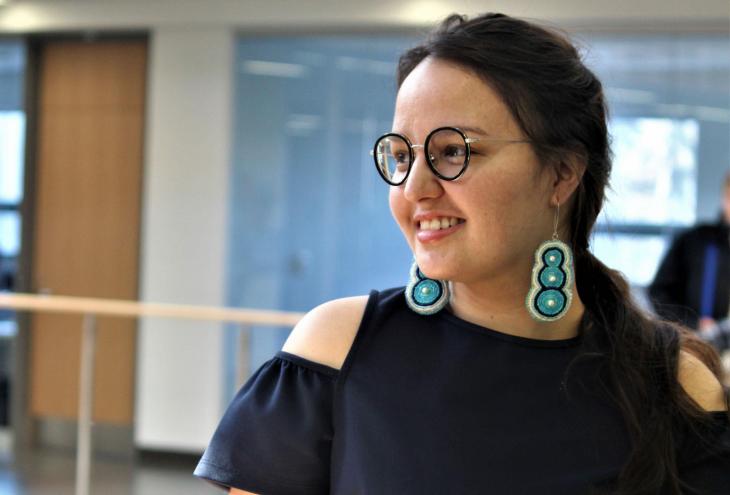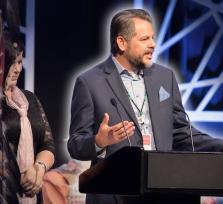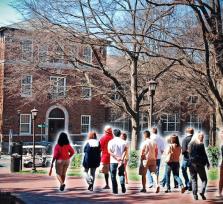Kaella-Marie Earle can’t remember a time she wasn’t interested in engineering. Even as a child she would visit factories with her father, an electrical engineer, and he would show her various industrial processes. She was fascinated and knew she would follow her father into engineering. As a current engineering major with a focus on industrial processes, Earle is well on her way to that goal.
Born in Sudbury, Ontario, as a child Earle experienced several moves to follow her father’s career. Indigenous residents were few in number in the family’s new hometowns and Earle often found it hard to fit in. In one rural town, Earle and her brother even faced severe racism; in another, she recalls anti-Indigenous sentiments at her elementary school.
As a refuge, Earle developed her own interests, including exploring the world of engineering with her father. “He came back from every business trip with hundreds of pictures of nuts, bolts, and wires, and he’d sit us down for multihour presentations in front of various types of electrical equipment,” she says. “I knew I needed to model my career after this kind of sheer fascination with something.”
Entering high school, Earle had a clear objective: to do well enough to get into a university engineering program. She found help in an unexpected place: a world religion course made her realize it’s OK to follow her own spiritual path. “It was the beginning of my search for my Anishinaabe cultural identity,” says Earle, “which has played an important role in managing my mental and physical health.”
Both were tested when she entered Laurentian University in Sudbury in 2010 and struggled to find her footing. “I ended up failing a bunch of courses due to depression, PTSD from an abusive relationship, and thoughts of suicide,” says Earle. She found little support on campus, and eventually dropped out.
She leaned on her family, and decided to go back to school. At Cambrian College in Sudbury, Earle found the support she’d been seeking. “The advisor saw my old transcript and all my failing grades,” says Earle. But instead of berating her as previous advisors had done, he told Earle how much he believed in her ability to succeed. “I was so shocked that someone had this confidence in me, I actually cried,” she recalls. “I was shown kindness and humanity by an academic advisor, and it changed my life.”
As she moves closer to her goal of advancing Indigenous ethics in engineering operations, Earle wants others to take care of themselves.
With her boosted confidence, Earle completed her college coursework. She set her sights on engineering at Laurentian University — a different path was never an option. “I know I belong in engineering,” says Earle. But her return to Laurentian was a difficult journey.
Despite her good grades from Cambrian, the university rejected Earle’s application for readmission and her subsequent appeal. But when Laurentian did offer her a place in the liberal arts program, Earle was angry. “It’s racist to push Indigenous students into arts when they want to be in science and engineering,” she says. After persistently arguing her case, Earle was able to enter the engineering program.
Even now that she is doing well, Earle finds her university experience challenging in a variety of ways. “The basic recognition that Indigenous students have unique issues that require unique resources is a critical piece,” she notes. In addition, Earle has an autoimmune disease that creates a physical disability. “Trying to provide enough proof for the university to accommodate my disability has been difficult,” she says.
Still, Earle has persevered. She is currently involved in a variety of programs both on and off campus that support Indigenous people: she is the president and founder of the Laurentian University Project Engineering Society and the founder and director of Maamiwi Gibeshiwin — an annual Anishinaabe camp designed to provide a safe place for young Anishinaabeg to reclaim their cultural identity through teachings and experiential learning on the land.
Earle credits her family and access to appropriate health resources for her success. “I have a supportive family and access to cultural knowledge and methods of health and well-being,” she says. Her current internship at Enbridge Gas Distribution has taught her the importance of caring collaboration. “It’s easy to feel good about the work you do as long as it’s done in the spirit of taking care of each other,” she adds.
As she moves closer to her goal of advancing Indigenous ethics in engineering operations, Earle wants others to take care of themselves. “Especially as an Indigenous person, it’s an ongoing battle to recognize that you are worthy of love and success, and to exist the way you want in a place you want,” she says. But she believes everyone can succeed. “You really are worthy,” Earle continues. “It’s OK to be Indigenous and be in college; to be Indigenous and working in oil, gas, and mining industries; to be Indigenous and an engineer or a scientist. Recognize the strength it took to get where you are, and congratulate yourself often.” Every step is a victory; Earle has taken several steps, and is savoring each victory along the way.














